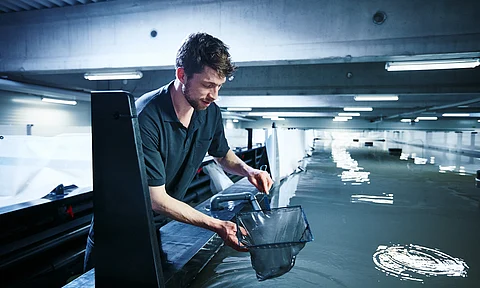

Oceanloop will construct a first-of-its-kind large scale inland farm for white leg shrimp in Gran Canaria, with an annual capacity of 2,000 tonnes per year.
Photo: Oceanloop
The European Investment Bank (EIB) has announced a €35 million loan to Munich-based food-tech company Oceanloop, marking a significant investment in sustainable aquaculture technology within the European Union.
This venture-debt financing, backed by the EU’s InvestEU guarantee programme, aims to support Oceanloop’s ambitious plans to expand its indoor shrimp farming operations and advance its innovative recirculating aquaculture system (RAS) technology.
Founded in 2012, Oceanloop operates two pilot shrimp farms in Kiel and Munich, Germany, producing high-quality, sustainable shrimp as an alternative to non-EU imports.
The funding from EIB will be directed towards two major projects: expanding Oceanloop’s research and development facility in Kiel, increasing its capacity from 5 tonnes to 60 tonnes per year, and constructing a first-of-its-kind, large-scale inland shrimp farm in Gran Canaria with an expected annual output of 2,000 tonnes of white-leg shrimp.
Oceanloop’s RAS technology enables precise control over farming conditions, optimizing efficiency and resource use while meeting EU standards for sustainability and animal welfare. Through advanced digital technologies, including AI and computer vision, Oceanloop monitors biomass and stress levels in real time, ensuring a high level of animal care.
This expansion is particularly relevant as Europe remains heavily reliant on shrimp imports, with over 5 million tonnes of white-leg shrimp produced globally each year.
“While the demand for sustainably produced animal proteins will increase significantly in the coming years, their sources are particularly at risk today. Decades of overfishing and an unsustainable aquaculture industry that cannot be controlled in times of climate change are leading to an increasing risk of supply chain disruptions to Europe. We are thrilled that the EU has recognized this and is helping us to bring our innovative technology to industrial-scale commercialization.”, said Oceanloop’s founder and CEO Fabian Riedel, in an EIB press release.
In addition to shrimp production, Oceanloop is committed to minimizing waste through innovative circular economy practices, including vapour-thermal carbonization for bio-coal fertilizer production and anaerobic digestion for biogas. Renewable energy generated through wind and solar installations will further enhance the farm’s sustainability.
“The European Investment Bank supports European tech pioneers with European ambitions that push forward innovative solutions. Oceanloop is a perfect example of our commitment to help start-ups and scale-ups in their growth phase with the right financing solutions”, said EIB Vice-President Nicola Beer.
“Developed here in Europe, their innovative technology opens new ways to produce seafood environmentally friendly by integrating new technologies in their aquaculture-business. The reduction of water-usage and CO2-emissions supports preserving the environment while producing protein rich high-quality seafood on land," she added.
This EIB investment aligns with InvestEU’s mission to drive technological innovation in Europe, with the broader programme aiming to mobilize over €372 billion in investments by 2027.
